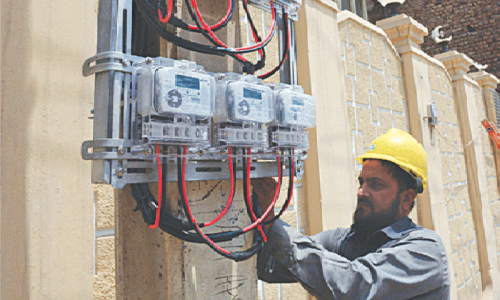KARACHI: Since Pakistan's biggest electricity company was privatised, its headquarters have been looted, its employees kidnapped and the government tried to arrest its boss.
It's been a roaring success.
Power cuts lasting 12 hours a day or more have devastated Pakistan's economy. The loss of millions of jobs has fuelled unrest in a nuclear-armed nation already beset by a Taliban insurgency.
The only city bucking the trend is the violent megacity of Karachi, Pakistan's financial heart - thanks to Tabish Gauhar and his team at the Karachi Electricity Supply Company (KESC).
"It has consumed every ounce of my energy," 42-year-old Gauhar told Reuters in his wood-panelled office. "But we have helped millions of people."
The new government of Prime Minister Nawaz Sharif won an election in May partly because it promised to fix the power cuts. Now many are wondering if KESC's successful privatisation will be repeated elsewhere.
The government is due to release its energy strategy this week. One official said it was going to look closely at privatising more state-run power companies.
Power Struggle
Pakistan's power companies share similar woes. Staffs are often corrupt and influential families won't pay bills. The government sells power below the cost of production but pays subsidies late or not at all. Plants cannot afford fuel.
At the state-run Peshawar Electricity Supply Company, the majority of staff are illiterate, most new hires are relatives of existing staff and 37 per cent of power generated was stolen, a 2011 USAID-funded audit found.
KESC had all the same problems when Dubai-based private equity firm Abraaj Capital bought a controlling stake in 2008. Gauhar and his Abraaj team decided to slash the workforce by a third, cut off non-payers and destroy illegal connections. It started a war.
Redundant employees offered to work for free because they made such fat kickbacks. When management refused, thousands of protesters ransacked KESC's headquarters. They camped outside for months.
Gunmen attacked Gauhar's house. Workers crossed picket lines every day on the floor of police cars and more than 200 KESC employees were injured.
"We felt very lonely then," said Gauhar, who moved from CEO to chairman of KESC earlier this year. "When I used to visit one of our injured employees in the hospital it was hard for me to look them in the eye."
Many in the populist pro-labour government vilified KESC. Later, legislators tried to arrest Gauhar for not attending sub-committee meetings in the capital.
Collecting Cash
After the protests dissipated, KESC's next problem was making customers pay. More than a third of KESC's electricity was stolen in 2009. Those who got bills often ignored them.
One wealthy patriarch said he couldn't possibly start paying because his colleagues would think he had no influence left.
KESC started cutting off non-payers. When a transformer burned out in an area with high theft, KESC asked for two months' payment from the area's residents before replacing it.
KESC divided up the city of 18 million. Areas where 80 per cent of people pay bills now have no regular power cuts. Areas with high loss — often crime-ridden, sweltering slums — have long power cuts. KESC is widely hated there.
Driver Muhammed Fayyaz says his neighbourhood often has up to 10 hours of cuts per day. Summer temperatures top 40 degrees Celsius and protests are frequent.
"People block the main road and throw stones at passing vehicles," he said.
Fayyaz lives in a high-theft area. Stealing power is easy. Makeshift wires with metal hooks festoon KESC's lines in the sun-baked streets. Some lead to roadside businesses. Others head into the distance atop lines of makeshift bamboo poles.
"We clean them up but in five minutes they are back again," said KESC manager Muhammad Siddiq.
Mafias control the illegal lines. KESC staffs who remove them are often attacked. Ten were taken hostage in a single incident last month. A mob attacked Siddiq's office hours after he spoke to Reuters.
Some slums are held by the Taliban or gangs, and KESC staff can't even enter. They are experimenting with licensing powerful local businessmen to collect bills and cut off non-payers.
Brighter Future?
But the painful reforms have begun paying dividends. Last year the company made its first profit in 17 years. Theft has fallen by 9 per cent in four years. Half the city, including two industrial zones, does not have daily power cuts.
"It has made a big difference to my business," said tycoon S.M. Muneer, whose leather and textile factories employ thousands. "I cannot run a textile factory on a battery from my car."
Not everyone is happy. Gas shortages and maintenance problems still cause long power cuts. Customers who do pay bills suffer if their neighbours don't. Many poor can't afford the bills.
To improve customer relations, KESC gives free power to hundreds of charity schools and uninterrupted or subsidised power to 18 big public hospitals. KESC also built new call centres, connections and power plants.
The gleaming Chinese-built gas plant at the city's Bin Qasim port can generate 560 MW. But Pakistan rarely has enough gas for the plant to work at full capacity.
KESC blames that on national gas shortages, but the Sui Southern Gas Company, which is 70 per cent government-owned, says that KESC owes it $500 million. KESC disputes the figure is that high and says it is offsetting the payment against outstanding bills from government entities that total $720 million.
"We've still got problems," said Syed Nayyer Hussain, KESC's new CEO. "But at least we've started."



















































